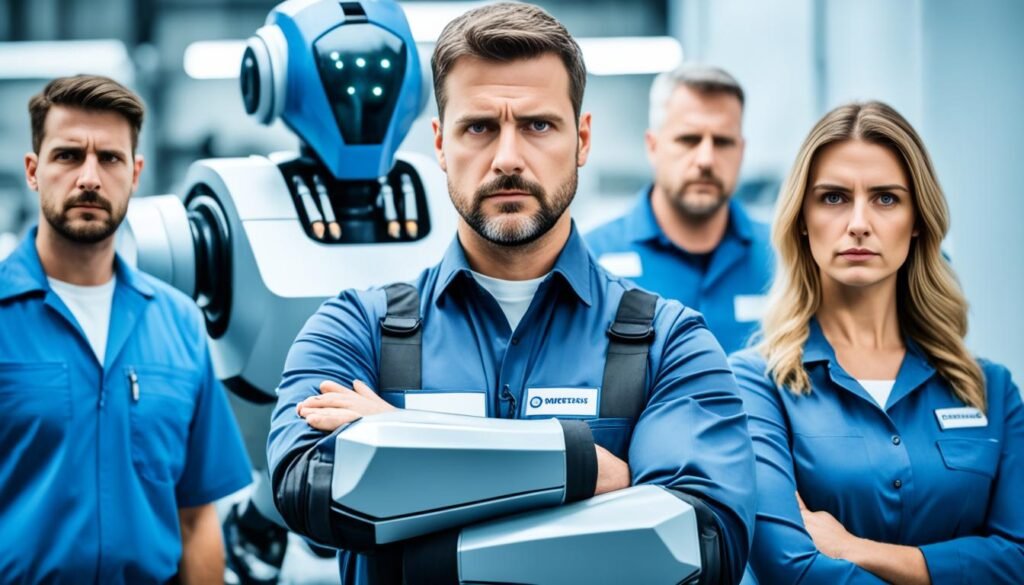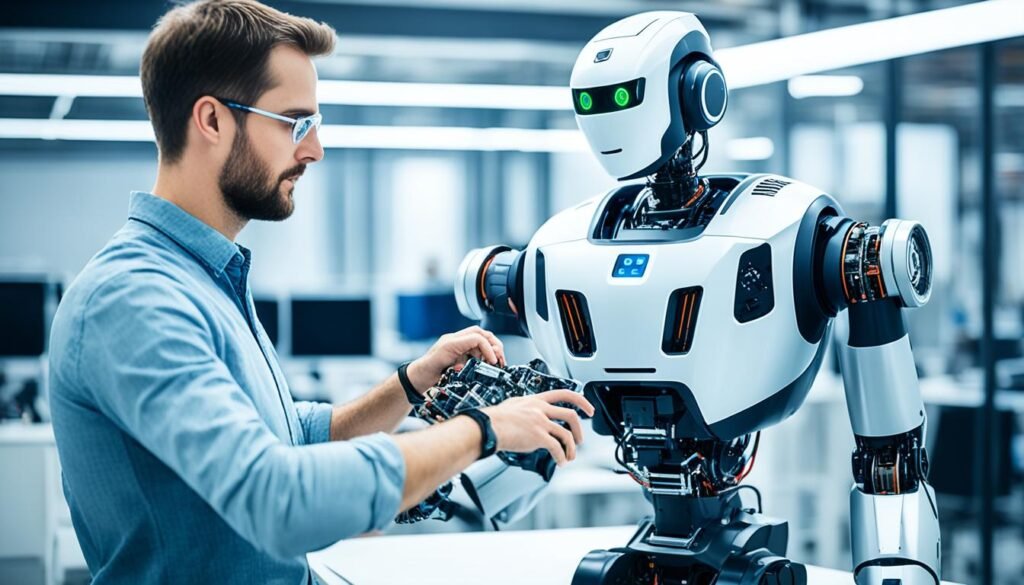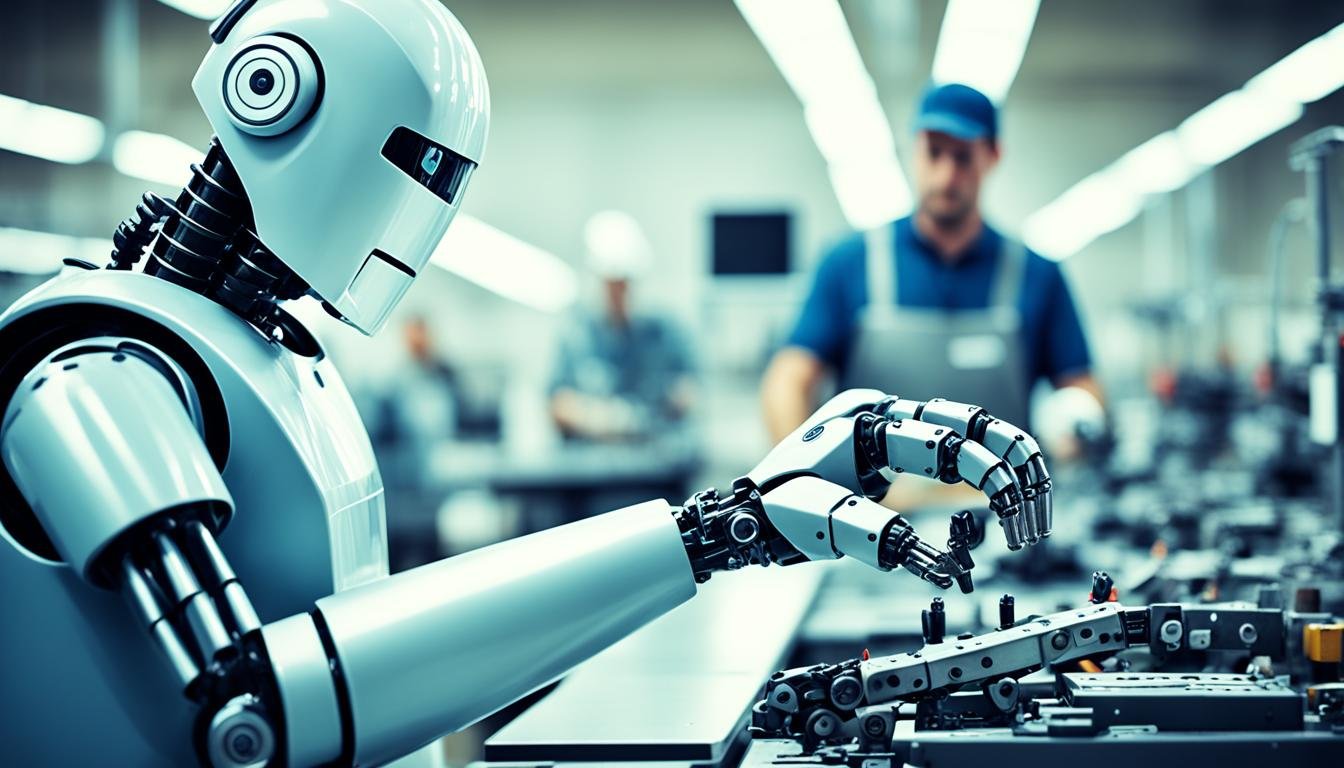The rise of artificial intelligence has brought new tech jobs and growth. But, it also raises big worries about its effect on the job market. Many white-collar workers worry they could lose their jobs to AI, which threatens their job security.
Goldman Sachs predicted in 2023 that the U.S. and Europe could lose 300 million jobs due to AI. A recent survey by ResumeBuilder found 37% of business leaders are using AI to replace staff. Also, 44% of executives think there will be more job cuts in 2024 because of AI.
Key Takeaways
- AI is expected to disrupt the job market, with an estimated 300 million jobs at risk in the U.S. and Europe.
- Over a third of business leaders have already initiated staff replacement with AI, and nearly half expect further job cuts by 2024 due to AI efficiency.
- The acceleration of AI has led companies to reallocate funds from downsizing towards investments in AI, machine learning, and automation.
- Roles involving social or emotional components, high-level decision-making, and customer-facing jobs are less likely to be replaced by AI.
- Data analysis, financial reporting, administrative tasks, and customer service are among the occupations highly vulnerable to AI-driven job displacement.
The Rise of AI and Its Impact on Employment
Artificial intelligence (AI) is changing the job market fast. It’s creating new tech jobs but also making people worried about losing their jobs. White-collar workers are especially concerned about becoming obsolete.
The Accelerated Ascendancy of AI
Since 2000, automation has taken away 1.7 million manufacturing jobs. The World Economic Forum says AI might replace 85 million jobs by 2025 but also create 97 million new ones. This shows how AI could change the job world a lot.
Concerns about Job Security and Redundancy
Many workers are worried about losing their jobs to AI. A report says 30% of workers worldwide fear AI might replace their jobs within three years. In India, 74% of the workforce is concerned about AI taking their jobs. AI could replace 300 million full-time jobs globally by 2030.
AI’s Collision Course with White-Collar Jobs
AI isn’t just affecting manual or low-skilled jobs. White-collar workers earning up to $80,000 a year are most at risk. Jobs like customer service, programming, research, and writing could be taken over by AI.
“AI is reaching up from the factory floors into the office spaces where white-collar, higher-paid workers tend to be,” according to Rakesh Kochhar, a senior researcher at Pew Research Center.
Jobs Less Likely to Be Impacted by AI
AI’s rapid growth has made many worry about job losses. But, some jobs are less likely to be taken over by AI. These jobs often need a lot of social skills, complex thinking, and human interaction.
Roles Requiring Substantial Social or Emotional Elements
Jobs that need a lot of empathy and social skills are safe from AI. This includes therapists, counselors, and teachers. They help people deal with life’s tough times in ways AI can’t.
High-Level White-Collar Decision-Makers
Top executives and management consultants are safe from AI too. They make big decisions that AI can’t match. Their skills in understanding complex situations and making judgments are hard for AI to copy.
Customer-Facing Roles and Relationship Building
Salespeople and customer service reps are also safe from AI. They need to understand people’s needs and build strong relationships. These skills are hard for AI to learn, so these jobs are secure.
As AI gets better, we see that some jobs are safer from automation. Jobs that need human skills like empathy, creativity, and building relationships are more likely to stay in demand.

| Occupation | Projected Growth by 2032 |
|---|---|
| Nurse Practitioners | 45.7% |
| Choreographers | 29.7% |
| Physician Assistants | 27.6% |
| Mental Health Counselors | 22.1% |
| Nursing Instructors and Teachers at the post-secondary level | 21.5% |
| Coaches and Scouts | 20% |
| Athletic Trainers | 17.5% |
| Physical Therapists | 16.9% |
| Orthotists and Prosthetists | 16.8% |
| Occupational Therapists | 13.9% |
Jobs like leadership, creative work, and research are also safe from AI. They need skills AI can’t match, like strategic thinking and emotional intelligence.
“Confidence is a unique human quality that AI lacks, giving humans an advantage in roles that require belief in progress and innovation.”
As AI gets better, workers need to keep learning and adapting. Knowing which jobs are safe from AI helps people make smart career choices. This way, they can get ready for the changing job market.
which jobs can ai replace
Artificial intelligence (AI) is getting better, making people worry about losing their jobs. Many jobs and tasks could be taken over by AI, affecting workers in different fields.
Data Analysis, Bookkeeping, and Administrative Tasks
Jobs like data analysis, bookkeeping, and simple financial reporting are at risk. AI can quickly go through big datasets, spot trends, and make reports. This makes these jobs likely to be replaced.
Repetitive Processes, Scheduling, and Basic Customer Service
AI is now doing jobs that involve repeating tasks, scheduling, and basic customer service. Chatbots and virtual assistants can answer many customer questions well. This means humans might not be needed for these tasks as much.
AI-Powered Writing Tools Impacting Media and Marketing
AI writing tools are changing jobs in media and marketing. They can make content like news articles, blog posts, and social media updates. This could change the need for human writers and creators in these areas.
A study by MIT found workers were 37% more efficient with ChatGPT, an AI writing tool. This shows AI could help make some jobs better, but we don’t know how it will affect jobs long-term.
Knowing which jobs might be replaced by AI is important for workers to get ready. Learning skills like emotional intelligence, creativity, and problem-solving can help workers stay relevant in the AI age.
The effect of AI on jobs is a big topic. Some jobs and tasks are more likely to be automated than others. By keeping up with trends and using AI, workers can prepare for the changing job market.
The Most Vulnerable Professions
AI is changing the job world fast, making some jobs more at risk. Jobs that deal with data, bookkeeping, and simple customer service are now often done by AI. This is because AI can handle these tasks well.
A report by Goldman Sachs says AI could change 300 million full-time jobs worldwide. By 2025, 80 percent of customer service and support organizations will use generative AI, as Gartner found. Also, AI is a threat to jobs in media, like advertising and journalism, as AI writing tools get better.
Jobs like legal assistants and paralegals, which involve a lot of data work, could be automated by AI. Financial analysts are also at risk. AI can analyze data, predict investments, and spot trends well.
| High-Risk Occupations for AI Automation | Percentage of Jobs Exposed to AI |
|---|---|
| Management Consultants | 80% |
| Business Analysts | 75% |
| Financial Managers | 70% |
| Accountants | 65% |
| Psychologists | 60% |
In 2022, about 19% of American workers were in jobs that could be easily replaced or helped by AI. These jobs are often in high-paying fields that require a college degree and analytical skills.
“10-30% of occupations can be automated by AI.”
As work changes, it’s important for people and companies to know how AI might affect different jobs. They should also work on updating their skills and plans to stay ahead in the changing job market.

Slow-Walking Hiring: Companies’ Wait-and-See Approach
Companies are now being cautious about hiring due to AI’s growing impact on jobs. They’re waiting to see how things will change. This is because of economic uncertainty and plans to change their business strategies. They’re watching how AI will take over white-collar jobs.
Executives from big tech companies like Alphabet and Microsoft have talked about changing their workforce to focus more on AI. They plan to do this without hiring too many new people. This shows that companies are slowing down on hiring for AI jobs, expecting AI to automate these roles soon.
Economic Uncertainty and Business Transformations
The economy is unstable right now, making companies think twice before hiring. They’re watching how their businesses grow and are careful about making long-term hiring decisions. They want to see how the market changes before investing in new staff.
Many companies are also changing their focus to use AI more or making their operations simpler. During these changes, they might not hire new people right away. Instead, they’ll use AI and automation for tasks that humans used to do.
Anticipating AI Takeover of White-Collar Tasks
Companies are keeping an eye on how fast AI technology is getting better. They’re worried about how it will affect white-collar jobs. As AI can now automate tasks like data analysis and customer service, companies are being careful about hiring. They’re waiting to see how these changes will play out before hiring more people.
This cautious approach by companies will affect job seekers a lot, especially those in jobs that might be automated by AI. With companies delaying hiring and choosing AI over people, the competition for jobs will get tougher. This will make it harder for job seekers to find work in some areas.
AI as an Enhancer or Augmenter
AI is not set to replace humans in the job world. Instead, it will augment and enhance human capabilities. AI can automate tasks and make processes smoother. But, we still need human skills like critical thinking, creativity, emotional intelligence, and social skills.
AI’s Potential to Augment Human Capabilities
AI tools and technologies can amplify human efforts. For instance, in healthcare, AI can look at medical images faster and more accurately than humans. This could save lives by making diagnoses quicker. In finance, AI helps traders by spotting patterns in market data.
There’s a big need for skills in programming, AI development, and data analysis. People need to acquire these in-demand skills to stay competitive. Learning and developing new skills will be key as some jobs change or disappear and new AI jobs come up.
The Need for Human Skills and Judgment
AI can automate many tasks, but some skills like creativity, emotional intelligence, and complex decision-making are hard for AI to match. People who can combine their human skills with AI-powered tools will do well in the future job market.
Companies should invest in training programs to teach employees about AI. This encourages a culture of learning and innovation. Also, AI systems should be made and used ethically, focusing on fairness, transparency, and avoiding bias.
By taking an augmentation-oriented approach, we can use AI to boost human abilities. This way, humans and AI work together, leading to more productivity, creativity, and innovation.

Reskilling and Upskilling for the AI-Driven Future
Artificial intelligence (AI) is changing the job world fast. Many studies show how automation and AI will change jobs. The Organisation for Economic Co-operation and Development said in 2019 that AI could take away 14% of jobs and change another 32% in 15 to 20 years. Over 1 billion people will face changes in their jobs.
To keep up, reskilling and upskilling are key for workers and employers. First, figure out if your job might be replaced by AI. Then, look for new career paths. Learning new skills is vital to keep up with the AI-driven future.
Assessing Job Susceptibility and Alternative Career Paths
It’s important to see if your job could be taken over by automation. Look for areas in your field less likely to be affected. Use your skills in different areas. Find new careers that match your interests and skills, and be ready to change as jobs evolve.
Continuous Learning and Skill Development
Learning and improving your skills is key to keeping up with job changes. Many online platforms offer courses and training to help you learn new things. With new AI like ChatGPT coming, it’s more important than ever to keep learning.
New and Emerging Roles in the AI-Powered Workforce
AI won’t just replace jobs; it will also create new ones. Jobs like AI specialists, data scientists, user experience designers, and AI ethics officers are on the rise. By learning about these new roles and getting the right skills, you can succeed in the AI era.
“Executives estimate that about 40% of the workforce needs to reskill in the next 3 years.”
Reskilling and upskilling are a must. As AI and automation change jobs, we all need to adapt. By looking at which jobs might change, finding new careers, and learning new skills, you can do well in the AI-driven future.
Becoming Irreplaceable in the Age of AI
The rise of artificial intelligence (AI) is changing the job world. To stay ahead, you need to make yourself a must-have for your employer. Building a strong personal brand and becoming a top expert in your field is key to avoiding being replaced by automation.
Developing a Personal Brand and Niche Expertise
To stand out from AI, create a unique personal brand. This means having skills and a voice that make you different. Find your niche – the area where you can shine and be the top expert. By knowing your field deeply and showing your skills, you become a vital asset AI can’t match.
Standing Out as an Industry Leader
To protect your career in the AI era, be a leader. Actively connect with your work community, write for industry magazines, and share your knowledge widely. Show you’re a thought leader by speaking at events, attending industry gatherings, and using social media to grow your reputation.
AI can automate tasks, but it can’t replace the special value a respected expert adds. By always showing your skills, flexibility, and problem-solving abilities, you’ll be seen as essential in your job. This way, you’ll keep your career safe from AI threats.
“In the age of AI, the most valuable asset you can possess is not technical skills, but the ability to think critically, solve problems creatively, and adapt to changing circumstances.”
Conclusion
The fast growth of artificial intelligence has raised big worries about its effect on jobs, especially for those in white-collar positions. Jobs that involve data analysis, repetitive tasks, and basic customer service are likely to be automated soon. But, jobs that need a lot of social, emotional, and decision-making skills are less likely to be taken over by AI.
Companies might wait to hire as AI takes over some white-collar work. But, AI is more likely to help humans do their jobs better than replace them entirely.
To keep your career safe from AI, it’s key to learn new skills, become an expert in a specific area, and lead in your industry. AI can’t easily copy these skills. The summary of AI’s job replacement impact and the key takeaways show we need to adapt and keep learning to do well in the future.
AI might change some jobs, but it also brings new chances, especially in IT. Jobs like data scientists, machine learning engineers, and AI developers are expected to grow. By accepting the new tech and growing personally, workers can make themselves essential in the AI era. This ensures they’ll do well in their careers for a long time.
FAQ
What is the impact of AI on the job market?
AI is changing the job market fast, making some workers worried. It’s taking over jobs that involve data analysis, repetitive tasks, and simple customer service. But, jobs that need social, emotional, and decision-making skills are safer from AI.
Which jobs are most vulnerable to AI replacement?
Jobs at risk from AI include data analysis, bookkeeping, and repetitive tasks. Also, jobs that involve routine and scheduling are being taken over by AI. AI is also changing jobs in media and marketing.
Are companies delaying hiring due to the threat of AI?
Yes, some companies are waiting before hiring due to uncertainty and changes in business plans. They’re watching how AI will affect jobs, thinking it might do many tasks that humans currently do.
How can workers future-proof their careers against AI displacement?
To protect your job, focus on learning new skills and becoming an expert in your field. Keep learning and finding new skills will help you in the changing job world. Also, look into jobs that AI won’t easily take over.
Will AI fully replace white-collar jobs?
It’s unlikely AI will replace all white-collar jobs soon. AI will likely help make human work better, not replace it. Workers who use AI wisely will do well. AI can’t solve all work problems and we still need human skills like thinking, creativity, and social skills.
